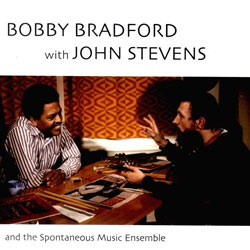
Charting the various twists and turns of the Spontaneous Music Ensemble's journey through time gets easier with each passing month, as new recordings surface and old ones are re-issued. Here we have a case of the latter, this being a re-release of a 1974 LP coupled with it's proposed, never-released, second installment. It is particularly interesting as a document of the interface between American and British Free Improvisation, with a marked resemblance to slightly older forms of Jazz (with a big J).
The SME this time out was John Stevens with Trevor Watts on alto and soprano saxes, Bob Norden on trombone, Ron Herman on bass and Julie Tippetts lending voice and guitar. The serendipitous occasion of their meeting(s) with Ornette Coleman alumnus Bobby Bradford is detailed in the liner notes, and seems to have been just one of those funny things that can happen when people are in the right place at the right time.
The lead tune, "His Majesty Louis", (these are all at least partly composed pieces) sounds very much like a cross between mid-sixties Ornette and a dixieland ensemble, with all the horns speaking in rapid succession after a beautiful ensemble head. It even falls in and out of fairly strict jazz rhythm, four on the floor bass and drums, eventually dribbling off like it's going to take a nap, sounding somewhat like tuning a radio between eras. Tippetts joins on "Bridget's Mother" with continuous scatting and sighing as the horns weave around her. "Room 408" returns us to Coleman land, and I can't decide whether it's Watt's alto, or Bradford's phrasing that makes the comparison seem so apt. Stevens here amps up the power, throwing rapid-stroke rolls out like so many insistent suggestions, and the whole seems more frantic for it. "Tolerance/To Bob" is a lazy stab and squeak, with Tippetts again rather center stage. This one sounds quite a bit more tentative and aimless at first, but eventually rallies over the course of it's 18 minutes.
The second disc's opener "Trane Ride/ Ornette-ment/ Doo-Dee" barks from the get-go, with rapid unison horn and drum lines and Herman's nervous bass pulse. The line unravels and stops before picking up to go off again. Watts warbles with a bit of Ayler-esque vibrato, and Bradford inserts backbeats — the interplay on this one is quite breath-taking.
"Norway" is a sleepy little folky sounding tune, with Watts again bending Ayler-like while stating the melody with Tippetts voice. "Rhythm Piece" is the least interesting bit here, as it is mostly a trio of Tippetts' voice with Herman and Stevens. It has some nice moments, but it wears thin over seventeen minutes. The final, short "Fragment" could've been the theme to some 1940's detective movie, albeit a left-of-center one. The end sounds like it was abruptly cut-off, leaving one to wonder how it would've played out.
Comments and Feedback:
|



